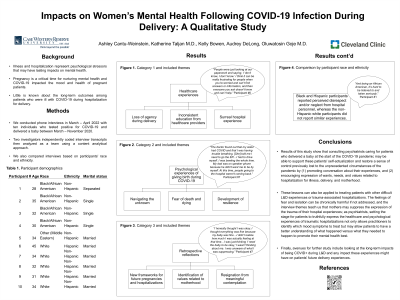Women's Mental Health
Session: Poster Session
(206) Impacts on Women's Mental Health Following COVID-19 Infection During Delivery: A Qualitative Study

Trainee Involvement: Yes

Ashley Cantu-Weinstein (she/her/hers)
Medical Student
Case Western Reserve University
Cleveland, Ohio, United States- KT
Katherine E. Taljan, MD
Associate Staff
Cleveland Clinic
Cleveland, Ohio, United States - KB
Kelly Bowen, n/a
2nd year medical student
Cleveland Clinic Lerner College of Medicine
Cleveland, Ohio, United States - AD
Audrey DeLong, n/a
Medical Student
Case Western Reserve University
Cleveland Heights, Ohio, United States 
Oluwatosin Goje, MD, MSCR, FACOG
Associate Professor, Ob-Gyn & Reproductive Biology
Cleveland Clinic Lerner College of Medicine, Case Western Reserve University
Cleveland, Ohio, United States
Presenting Author(s)
Co-Author(s)
Illness and hospitalization represent psychological stressors that may have lasting impacts on mental health. Pregnancy is a critical time for nurturing mental health and COVID-19, declared a global pandemic in March 2020, significantly impacted the mood and health of pregnant patients. However, little is known about the long-term outcomes among patients who were ill with COVID-19 during hospitalization for delivery at the pandemic's start. We conducted phone interviews with ten individuals who tested positive for COVID-19 and delivered a baby between March - November 2020. Four participants were non-Hispanic white and married, three were non-Hispanic Black and single, one was non-Hispanic Black and separated, one was Hispanic white and married, and one was non-Hispanic Asian and married. Interviews were coded by two investigators, then reviewed using a content analytical approach. We also compared interviews based on participants' race. Cleveland Clinic’s IRB approved this study. Analysis of the interviews revealed three categories, each including three themes: (1) healthcare experiences (agency, education, "surreal"), (2) psychological experiences (unknown, death/dying, resilience), and (3) retrospective reflections (new cognitive frameworks, core values, resignation). In addition, the Black and Hispanic participants reported perceived disrespect and/or neglect from hospital personnel, whereas the non-Hispanic white and Asian participants did not report similar experiences. Participants felt limited control over the course of their deliveries. This was compounded by isolation upon testing positive for COVID-19. Multiple participants described this as “surreal.” The hospital was quiet and empty, yet they felt fearful. Concurrently, nurses and physicians could not provide participants with consistent information regarding local and national policies. The psychological experiences similarly dealt with the unknown. Participants relied on media for information on COVID-19 infection during pregnancy, which mostly elicited fear and unease, contributing to rumination on death and dying. Amidst this, participants reported resiliency, with sentiments of having no choice but to push through the uncertainty and fear. Participants were surprised at how much emotion they suppressed during their pregnancies and deliveries. Now, participants recognize their past resignation but note that their most pertinent values related to motherhood rose to the forefront. The circumstances allowed participants to determine what they needed most regarding sickness, hospitalization, and delivery (i.e., a brief and peaceful hospital stay, extensive social support in the following weeks, etc.). Each Black and Hispanic participant reported at least one instance of perceived disrespect and/or neglect during prenatal care, delivery hospitalization, or postpartum care. This implies that the stressors of acute illness and the pandemic were heightened among Black and Hispanic participants compared to non-Hispanic white and Asian participants. Consulting psychiatrists caring for patients who delivered a baby at the start of the COVID-19 pandemic may be able to support these patients’ self-actualization and restore a sense of control previously lost to the unprecedented circumstances of the pandemic by (1) promoting conversation about their experiences, (2) encouraging expression of wants, needs, and values related to hospitalization for illness, delivery, and motherhood, and (3) advocating for integration of mental health care into routine obstetric practice.
Background:
Methods:
Results:
Discussion:
Conclusion:

